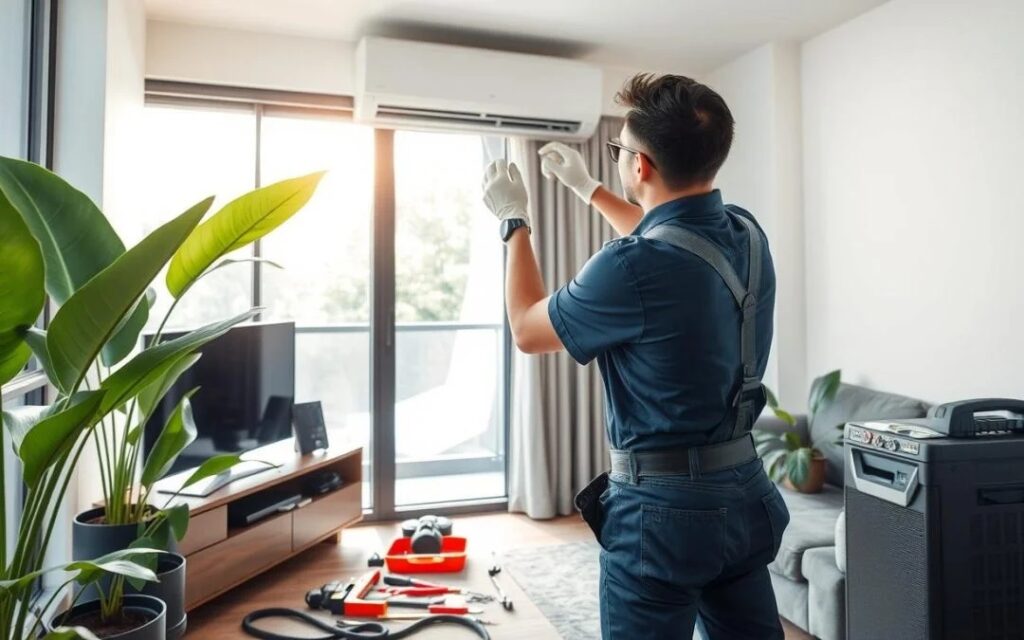The importance of timely aircon compressor repair in Singapore cannot be overstated in our tropical climate. With daily temperatures consistently hovering around 32°C and humidity levels reaching 84%, a failing air conditioning compressor can quickly escalate from a minor inconvenience to a major crisis. Understanding the early warning signs and taking prompt action can save homeowners thousands of dollars while ensuring continuous comfort in Singapore’s challenging climate.
The Hidden Language of Your Air Conditioner
Your air conditioning system communicates its health status through various signals that, when properly interpreted, can prevent catastrophic failures. The most telling sign often begins with unusual sounds – subtle changes in the normal operating symphony that most Singaporeans have grown accustomed to. When your system begins producing unfamiliar vibrations or rattling noises, it’s often the first indicator of compressor stress. According to recent industry data, these early warning sounds precede major failures in approximately 40% of cases.
Financial Implications of Delayed Action
The cost dynamics of compressor maintenance in Singapore follow a predictable pattern that savvy homeowners should understand. Emergency repairs during peak hours can command premiums of up to 50% above standard rates, while weekend emergency services often incur surcharges of 75% or more. Regular maintenance, by comparison, typically costs between $80 to $150 per session – a fraction of emergency repair costs that can soar beyond $2,500.
Current market analysis shows that proactive maintenance can extend compressor life by 3-5 years in Singapore’s climate. This extension represents significant savings, considering that a complete system replacement can cost between $3,000 to $5,000. The mathematics of prevention becomes even more compelling when factoring in the lost productivity and discomfort associated with sudden system failures.
Environmental and Energy Impact
Singapore’s commitment to environmental sustainability adds another dimension to the compressor maintenance equation. The National Environment Agency’s data reveals that poorly maintained air conditioning systems consume up to 30% more electricity than their well-maintained counterparts. In a country where air conditioning accounts for approximately 40% of household electricity consumption, this inefficiency translates to substantially higher utility bills and an unnecessarily large carbon footprint.
Regular monitoring of energy consumption patterns can provide early indicators of compressor problems. A sudden increase in electricity bills, despite consistent usage patterns, often signals declining compressor efficiency. This decline typically begins gradually but can accelerate rapidly if left unaddressed.
Preventive Maintenance: A Strategic Approach
Professional maintenance should follow a structured schedule that aligns with Singapore’s climate patterns. Quarterly inspections become particularly crucial during the hottest months, typically from April to September, when systems face their greatest stress. These inspections should include comprehensive performance assessments, measuring factors like temperature differential, power consumption, and refrigerant pressure.
The installation of voltage regulators becomes especially important in areas with unstable power supply, as voltage fluctuations can significantly impact compressor longevity. Areas like Geylang, Bedok, and parts of Jurong have historically shown greater power supply variations, making such protection particularly valuable in these regions.
Making Informed Decisions
Understanding your system’s lifecycle proves crucial in managing maintenance decisions effectively. Singapore’s climate typically induces first signs of compressor stress between years 5-7 of operation, according to the Energy Market Authority’s data. This timeline can vary based on factors such as usage patterns, installation quality, and maintenance history.
A comprehensive approach to compressor health should consider multiple factors including the unit’s age, historical maintenance records, and current performance metrics. Systems older than seven years often require more frequent monitoring, as their risk of failure increases exponentially after this point. The cost-benefit analysis of repairs versus replacement becomes particularly relevant during this period.
The Long-Term Perspective
Investment in compressor maintenance extends beyond immediate comfort concerns. Singapore’s Real Estate Developers’ Association reports that well-maintained air conditioning systems can enhance property values by 3-5%. This appreciation factor becomes particularly relevant in a property market as competitive as Singapore’s, where functional, efficient air conditioning systems significantly influence buyer and tenant decisions.
Regular maintenance also contributes to better indoor air quality, an increasingly important consideration in Singapore’s urban environment. Modern air conditioning systems play a crucial role in filtering outdoor pollutants, but this capability depends heavily on proper compressor function and overall system health.
Conclusion
Understanding and addressing compressor health represents a crucial aspect of property maintenance in Singapore’s challenging climate. The path to avoiding costly aircon compressor repair in Singapore lies in vigilance, understanding, and proactive maintenance. By adopting a preventive approach and responding promptly to warning signs, homeowners can protect their investment while ensuring reliable comfort in Singapore’s perpetual summer.
